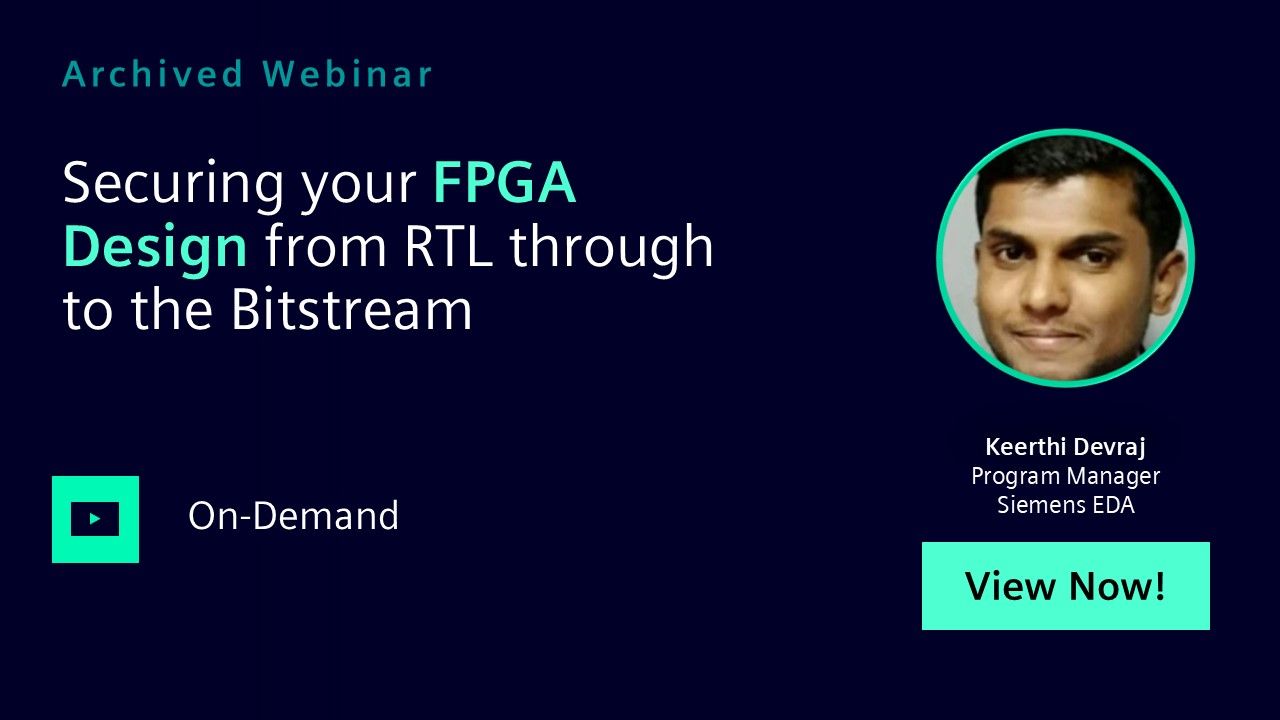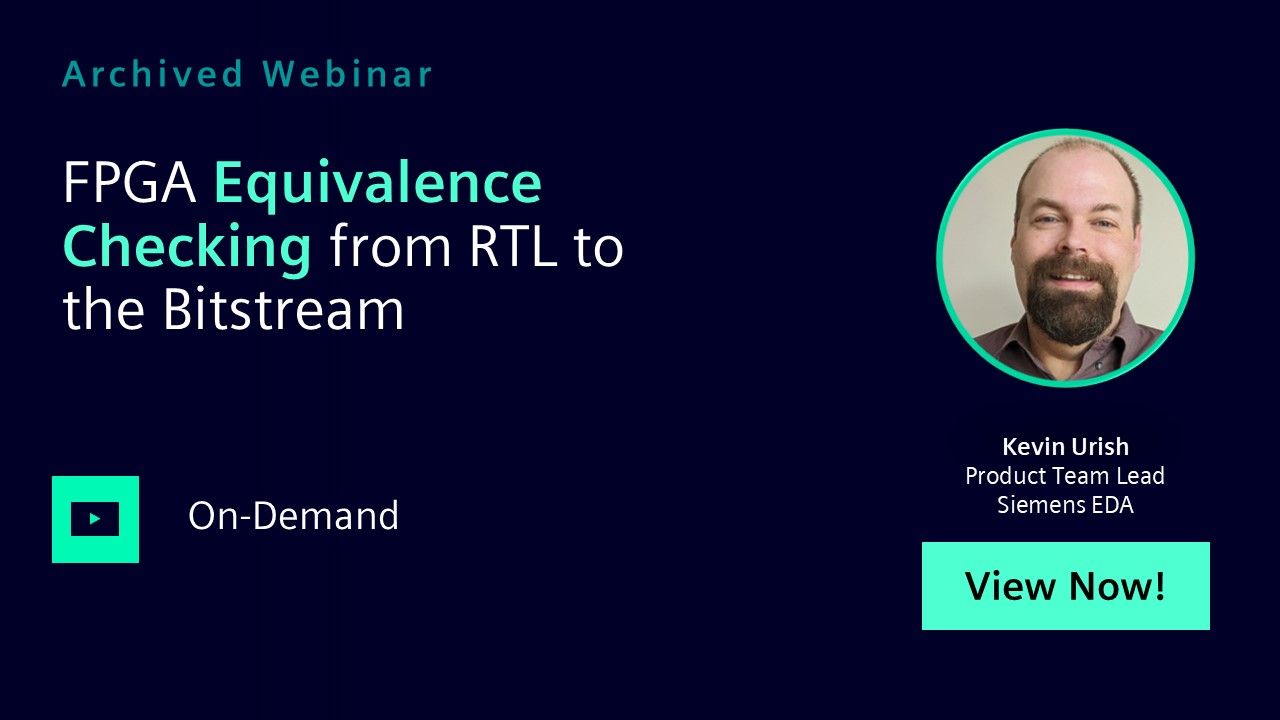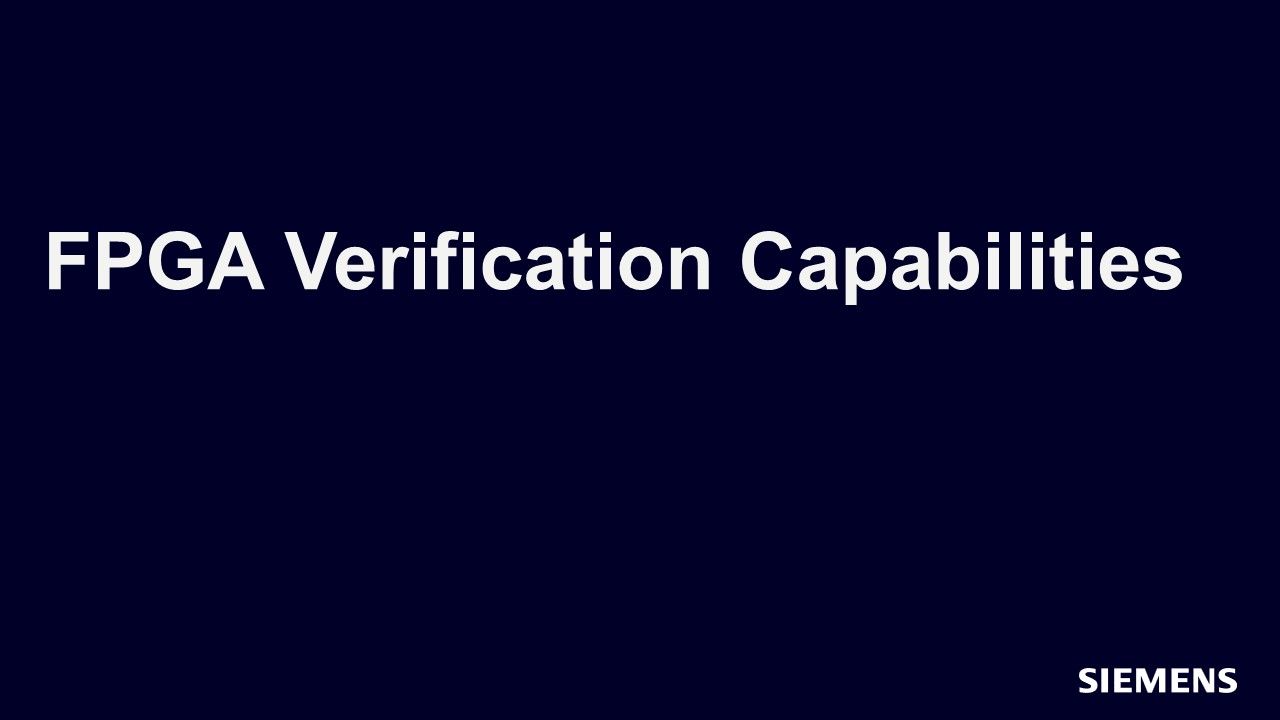FPGA Verification
FPGA (Field-Programmable Gate Array) verification, including methods like simulation and formal verification, is invaluable for ironing out design issues before deploying hardware in the lab. Simulation allows engineers to comprehensively test the FPGA design under various conditions, helping detect and rectify potential bugs and ensuring functionality. By conducting thorough FPGA verification, costly and time-consuming hardware iterations are minimized, significantly reducing the risk of errors and shortening the time-to-lab phase. This approach ultimately leads to more efficient development, lower expenses, and a faster path to achieving operational hardware.
-

On-Demand
Securing your FPGA Design from RTL through to the Bitstream
In this session, we will explore the critical role of hardware security verification, outlining why it is essential for protecting modern FPGA designs from RTL through to the FPGA bitstream, introducing practical tools such as the Siemens Analyze Architecture and VerifySecure technologies.
-

On-Demand
FPGA Equivalence Checking from RTL to the Bitstream
Security and safety policies across various domains such as aerospace and defense, embedded security, and automotive safety have been updated to require an FPGA verification chain spanning from verified HDL source, extending throughout the FPGA implementation tool chain, and culminating with the FPGA bitstream.
-
FPGA Verification Tracks
-

FPGA Verification Capabilities
This track introduces techniques for addressing complexity by evolving your organization’s FPGA verification process capabilities.
-
-
FPGA Verification Forum
-
Block Container - Overview
-
FPGA Verification Overview
FPGA (Field-Programmable Gate Array) verification is a crucial step in the design and development of digital circuits and systems. FPGA verification encompasses various techniques, including simulation, formal verification, and testing in a physical lab environment. In this comprehensive overview, we will explore the FPGA verification process, its components, and the significant benefits it offers in ensuring the reliability and functionality of FPGA-based designs.
The FPGA Verification Process
FPGA verification is a multi-step process that involves ensuring that a design meets its functional requirements, adheres to specifications, and is free from critical bugs or errors. The process typically includes the following stages:
Design Entry and Synthesis:
The FPGA verification process begins with the design entry phase, where engineers create a hardware description of the digital circuit using a hardware description language (HDL) like VHDL or Verilog. The design is then synthesized into a netlist that represents the logical elements and interconnections of the FPGA.
Simulation:
- Functional Simulation: Functional simulation is an essential step that involves using simulation tools (e.g., ModelSim, XSIM, or Questa) to verify the correctness of the design's functionality. Engineers write testbenches to simulate the design under various conditions and input scenarios. This process helps detect logical errors, validate the functionality, and ensure the design meets its intended purpose.
- Timing Simulation: Timing simulation extends the verification process to address the timing aspects of the design. It ensures that the design meets the required timing constraints, including setup time, hold time, and clock-to-q delays. Timing simulation helps identify potential timing violations and ensures the design operates reliably at the desired clock frequencies.
Formal Verification:
Formal verification involves mathematical proofs to establish the correctness of a design. It differs from simulation in that it doesn't rely on test vectors but instead uses formal methods to verify that the design meets specified properties or constraints. This technique is particularly useful for verifying critical aspects of the design where exhaustive testing may not be feasible.
Formal verification can be applied in several ways:
- Equivalence Checking: Equivalence checking verifies that the synthesized netlist matches the original RTL (Register-Transfer Level) design. It ensures that no discrepancies or unintended changes occur during synthesis.
- Property Checking: Property checking verifies specific properties of the design. Engineers define properties and use formal tools to prove or disprove them. This is valuable for verifying safety-critical properties, security properties, and more.
- Model Checking: Model checking exhaustively analyzes the state space of the design to verify properties or check for design errors. Model checking can be used to explore all possible states and transitions in the design.
Prototyping and Emulation:
Prototyping involves implementing the design on a physical FPGA or an FPGA emulator. It allows for real-time testing of the design under hardware conditions. Engineers can connect various interfaces and peripherals to the FPGA to validate its interaction with the external environment.
Emulation goes a step further by emulating the entire FPGA-based system, including multiple FPGAs, processors, memory, and peripherals. This stage can detect issues related to system-level interactions and provides a high level of confidence in the design's correctness.
Lab Testing and Validation:
In the lab, the FPGA-based design is subjected to physical testing to verify its real-world performance. This stage often includes connecting the FPGA to external devices, sensors, and interfaces, and validating its behavior in a practical environment. Engineers may also perform stress testing to ensure the design's reliability under extreme conditions.
Post-Implementation Verification:
After the FPGA design is implemented and deployed, post-implementation verification continues to validate the design in its operational environment. This step may include monitoring the FPGA's performance, ensuring it meets reliability and safety requirements, and performing field testing to identify any unexpected behavior.
BENEFITS OF FPGA VERIFICATION
FPGA verification is a critical aspect of ensuring the functionality and reliability of digital designs. The process offers several significant benefits:
Early Bug Detection:
Verification, especially through simulation and formal methods, allows for the early detection of design errors and bugs. Addressing issues at an early stage minimizes the cost and effort required for corrections and prevents costly post-production errors.
Functional Verification:
Simulation provides a means to verify that the FPGA design functions as intended. Engineers can create testbenches to test various aspects of the design's functionality and confirm that it meets the specified requirements.
Timing Verification:
Timing simulation ensures that the design meets the required timing constraints. This is crucial for FPGA designs that operate at high clock frequencies and require precise timing for proper functionality.
Formal Verification:
Formal verification methods, such as equivalence checking and property checking, offer a higher level of confidence in design correctness. These methods can verify safety-critical properties, security properties, and more, which are challenging to address through simulation alone.
Prototyping and Emulation:
Prototyping and emulation allow for real-time testing of the design on actual FPGA hardware. This provides insight into the design's behavior and its interaction with external interfaces, helping uncover integration issues.
Lab Testing and Validation:
Testing in a physical lab environment ensures that the FPGA design performs as expected in real-world conditions. It is particularly important for safety-critical systems, where failures can have serious consequences.
Stress Testing:
Stress testing reveals how the FPGA design performs under extreme conditions or unexpected scenarios. It helps uncover vulnerabilities and weaknesses in the design, allowing for improvements.
System-Level Verification:
Emulation and lab testing provide the opportunity to verify system-level interactions and interfaces. This is critical for complex FPGA-based systems that involve multiple FPGAs, processors, memory, and peripherals.
Reduced Post-Production Costs:
Identifying and addressing design issues during the verification phase significantly reduces post-production costs and the risk of costly recalls. It also contributes to a more efficient development process.
Higher Reliability and Safety:
Functional safety verification, including formal methods, enhances the reliability and safety of FPGA-based designs. For applications where safety is critical, such as automotive or medical devices, this is of paramount importance.
Accelerated Time-to-Market:
Efficient verification processes help accelerate time-to-market by ensuring that designs are thoroughly tested and ready for deployment. This is particularly advantageous in competitive industries where speed is crucial.
Continuous Improvement:
The verification process facilitates continuous improvement by identifying design issues, monitoring the FPGA's performance post-implementation, and applying lessons learned to future projects.
-
-
Block Container - Bullets
-
CHALLENGES IN FPGA VERIFICATION
While FPGA verification offers many benefits, it comes with its own set of challenges:
Complexity:
As FPGA designs become more complex, verification processes become more challenging. Complex designs require extensive testing and verification efforts.
Resource Intensiveness:
Verification can be resource-intensive, including the need for specialized tools, skilled engineers, and extensive computational resources for simulation and formal methods.
Changing Requirements:
Design requirements can change throughout a project, requiring constant adaptation of the verification process.
Interdisciplinary Collaboration:
FPGA verification often involves collaboration between hardware engineers, software developers, and verification engineers. Effective communication and coordination are essential.
-
BEST PRACTICES IN FPGA VERIFICATION
To address the challenges associated with FPGA verification, here are some best practices:
Early Planning:
Begin verification planning as early as possible in the design process. This allows for the identification of potential issues and ensures that verification is integrated seamlessly into the development cycle.
Documentation:
Maintain comprehensive documentation of the verification plan, verification results, and any design issues. Well-documented processes facilitate communication and knowledge transfer within the team.
Testing Automation:
Leverage automated tools and scripts for simulation, formal verification, and testing to improve efficiency and reduce the risk of human error.
Regular Reviews:
Conduct regular reviews of the verification plan and results. Continuous review ensures that the verification process remains aligned with project goals and allows for timely adjustments.
Training and Skill Development:
Invest in the training and skill development of verification engineers. A well-trained team is more capable of efficiently planning, executing, and analyzing the verification process.
Standard Compliance:
Adhere to relevant industry standards and safety regulations, especially in safety-critical applications. Compliance ensures that the design meets the necessary safety and quality requirements.
-
-
Block Container - Conclusion
-
FPGA Verification Conclusion
FPGA verification is a critical phase in the development of digital circuits and systems. It involves a multi-step process, including simulation, formal verification, and physical testing in the lab. The benefits of FPGA verification, including early bug detection, improved reliability, and safety, reduced post-production costs, and accelerated time-to-market, make it an indispensable part of modern electronics design. By following best practices and overcoming the associated challenges, engineering teams can ensure that FPGA-based designs meet their specifications, comply with safety standards, and perform reliably in their intended applications.
-